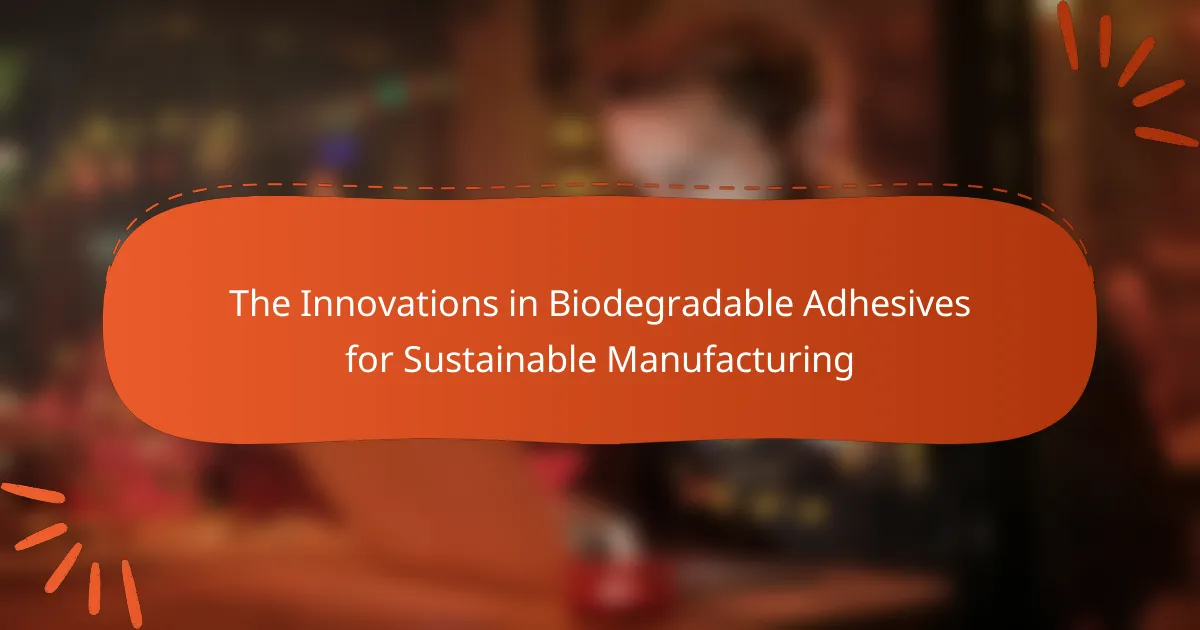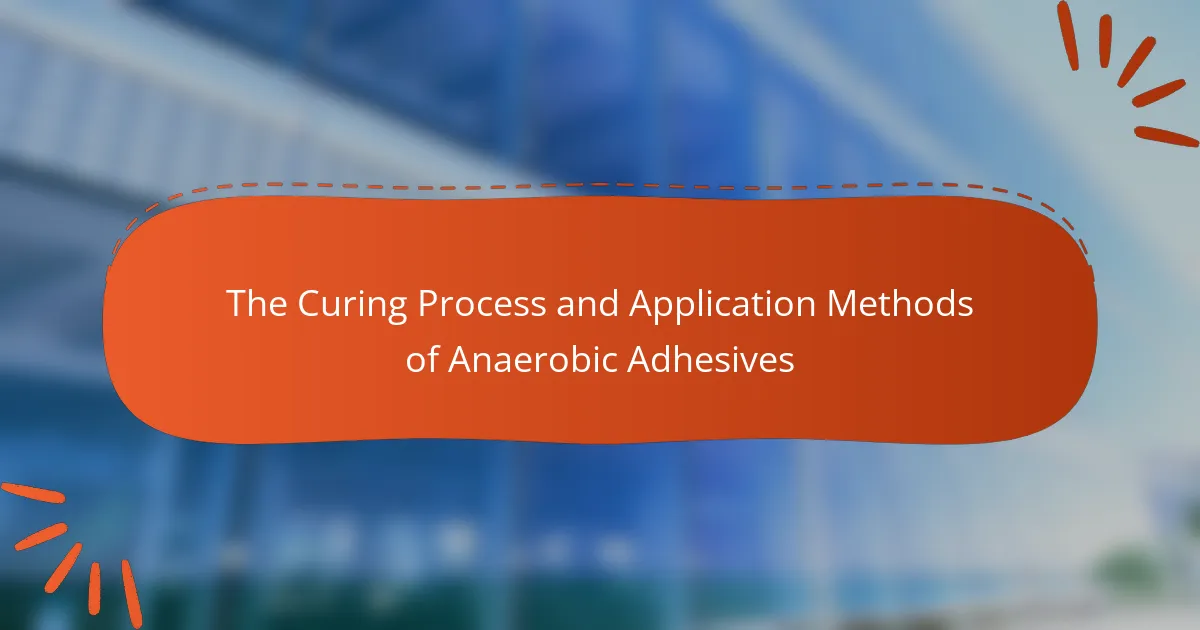Specialty adhesives are advanced bonding agents specifically formulated for high-performance applications across various industries, including automotive, aerospace, and electronics. These adhesives offer superior adhesion properties, durability, and resistance to environmental factors, making them ideal for bonding materials such as metals, plastics, and composites. Key benefits include enhanced product longevity, faster assembly times, and reduced reliance on mechanical fasteners. The selection of specialty adhesives is influenced by factors such as material compatibility, environmental conditions, required bond strength, and industry standards, ensuring optimal performance for specific applications.

What are Specialty Adhesives and Their Role in Industrial Settings?
Specialty adhesives are advanced bonding agents designed for specific applications. They provide superior adhesion properties compared to general-purpose adhesives. Industries use these adhesives for tasks that require high performance, durability, and resistance to environmental factors. Specialty adhesives can bond a variety of materials, including metals, plastics, and composites. They enhance product performance in sectors such as automotive, aerospace, and electronics. For example, epoxy adhesives are used in aerospace for their strength and temperature resistance. Additionally, polyurethane adhesives are favored in construction for their flexibility and moisture resistance. The precise formulation of specialty adhesives meets the unique demands of various industrial applications.
How do Specialty Adhesives differ from Regular Adhesives?
Specialty adhesives differ from regular adhesives in their formulation and intended use. Specialty adhesives are designed for specific applications, such as high-temperature resistance or bonding dissimilar materials. Regular adhesives are typically general-purpose and may not perform well under specialized conditions. For instance, specialty adhesives can provide enhanced durability, flexibility, or chemical resistance. These unique properties make them suitable for industries like aerospace, automotive, and electronics. Regular adhesives may lack these characteristics, leading to potential failures in demanding environments. Thus, the key distinction lies in the tailored performance of specialty adhesives compared to the versatility of regular adhesives.
What specific attributes define Specialty Adhesives?
Specialty adhesives are defined by their unique formulations tailored for specific applications. These adhesives often exhibit exceptional bonding strength to various substrates. They can be resistant to environmental factors such as heat, moisture, and chemicals. Specialty adhesives may also offer flexibility, allowing for movement without compromising the bond. Some formulations provide quick curing times, enhancing production efficiency. Additionally, these adhesives can be designed for specific materials, such as plastics, metals, or composites. Their versatility makes them suitable for diverse industrial applications, including automotive, aerospace, and electronics. The unique attributes of specialty adhesives ensure optimal performance in demanding conditions.
Why are Specialty Adhesives critical in industrial applications?
Specialty adhesives are critical in industrial applications due to their unique formulations that meet specific bonding requirements. They provide superior strength, flexibility, and resistance to environmental factors. These adhesives are designed for diverse materials, including metals, plastics, and composites. Their ability to bond dissimilar substrates enhances manufacturing efficiency. Specialty adhesives also improve product durability and longevity. According to industry studies, using the right adhesive can reduce assembly time by up to 30%. This efficiency leads to cost savings and increased productivity in manufacturing processes.
What are the common applications of Specialty Adhesives in various industries?
Specialty adhesives are widely used across various industries for their unique bonding capabilities. In the automotive industry, they bond components for enhanced durability and weight reduction. Specialty adhesives are utilized in aerospace for lightweight assembly and high-performance applications. The construction sector employs these adhesives for structural bonding and insulation materials. In electronics, they secure components and provide moisture resistance. The medical field uses specialty adhesives for device assembly and wound care applications. Specialty adhesives also find applications in packaging for secure seals and barrier properties. These diverse applications demonstrate the versatility and effectiveness of specialty adhesives in meeting industry-specific requirements.
How are Specialty Adhesives utilized in manufacturing?
Specialty adhesives are utilized in manufacturing to bond various materials effectively. They are designed for specific applications, such as automotive, aerospace, and electronics. These adhesives offer enhanced performance characteristics, including heat resistance and flexibility. For instance, structural adhesives are used to join metal and composite components in vehicles. This ensures durability and safety in automotive manufacturing. Specialty adhesives also reduce assembly time and improve production efficiency. They can bond dissimilar materials, which is essential in modern manufacturing processes. Research indicates that using these adhesives can lead to weight reduction in products, enhancing overall performance.
What role do Specialty Adhesives play in construction projects?
Specialty adhesives play a crucial role in construction projects by providing strong bonding solutions for various materials. They are designed to meet specific requirements such as moisture resistance, temperature tolerance, and load-bearing capacity. These adhesives enhance structural integrity by ensuring that components remain securely attached.
For example, in flooring applications, specialty adhesives prevent delamination and ensure longevity. In structural applications, they can bond metals, plastics, and composites effectively. The use of specialty adhesives can reduce the need for mechanical fasteners, leading to a cleaner aesthetic and potentially lower costs.
According to a study by the Adhesive and Sealant Council, specialty adhesives can improve energy efficiency in buildings by providing better insulation and sealing capabilities. This demonstrates their significant impact on both the functionality and sustainability of construction projects.

What are the Benefits of Using Specialty Adhesives?
Specialty adhesives offer several benefits in industrial settings. They provide superior bonding strength for various materials. Many specialty adhesives are designed to withstand harsh environmental conditions. They can resist temperature fluctuations, moisture, and chemicals. This durability enhances the longevity of bonded products. Specialty adhesives also enable faster assembly times, improving overall productivity. Additionally, they can reduce the need for mechanical fasteners, resulting in a cleaner finish. Their versatility allows for use in diverse applications, from automotive to electronics.
How do Specialty Adhesives enhance product performance?
Specialty adhesives enhance product performance by providing superior bonding strength and durability. These adhesives are formulated to meet specific requirements of various materials. They can bond dissimilar substrates effectively, which traditional adhesives may struggle with. Specialty adhesives also offer resistance to environmental factors such as temperature, moisture, and chemicals. This resistance ensures that the bond remains intact under challenging conditions. For instance, epoxy adhesives can withstand high temperatures, making them ideal for automotive applications. Additionally, specialty adhesives often cure quickly, reducing production times and increasing efficiency. Their precise application can minimize waste and improve overall product quality.
What advantages do Specialty Adhesives provide in terms of durability?
Specialty adhesives offer superior durability compared to standard adhesives. They are designed to withstand extreme temperatures, moisture, and chemical exposure. This makes them ideal for demanding industrial applications. Specialty adhesives maintain their bond strength over time, reducing the risk of failure. For instance, epoxy adhesives can endure high-stress environments without degrading. Additionally, many specialty adhesives exhibit resistance to solvents and oils. These properties ensure long-lasting performance in various conditions. Overall, specialty adhesives enhance the reliability and lifespan of bonded materials in industrial settings.
How do Specialty Adhesives contribute to cost efficiency?
Specialty adhesives contribute to cost efficiency by reducing material waste and improving production speed. They provide strong bonding solutions that often eliminate the need for additional fasteners or hardware. This can lead to lower overall material costs. Specialty adhesives also enhance the durability of products, which reduces the frequency of repairs or replacements. Many specialty adhesives cure quickly, allowing for faster assembly times and increased productivity. According to a study by the Adhesive and Sealant Council, using advanced adhesives can lead to up to 30% savings in assembly costs. These factors collectively make specialty adhesives a cost-effective choice in industrial applications.
What safety considerations are associated with Specialty Adhesives?
Specialty adhesives can pose various safety considerations. These adhesives may contain hazardous chemicals that can lead to health risks. Exposure to fumes can cause respiratory issues. Skin contact may result in irritation or allergic reactions. Proper ventilation is essential when using these adhesives. Personal protective equipment, such as gloves and masks, is recommended. Storage of specialty adhesives should follow safety data sheet guidelines. Disposal must adhere to local regulations to prevent environmental contamination.
How do Specialty Adhesives improve workplace safety?
Specialty adhesives improve workplace safety by providing strong, reliable bonds that reduce the risk of accidents. These adhesives minimize the need for mechanical fasteners, which can loosen over time and cause injuries. They also eliminate sharp edges and protrusions associated with screws and bolts. Specialty adhesives can bond dissimilar materials, ensuring structural integrity in various applications. This versatility reduces the likelihood of component failure. Additionally, many specialty adhesives are designed to be non-toxic and low-VOC, promoting a healthier work environment. Their use can lead to less noise and vibration during assembly, further enhancing safety. Overall, specialty adhesives contribute to safer workspaces by enhancing durability and reducing hazards.
What environmental benefits do Specialty Adhesives offer?
Specialty adhesives offer several environmental benefits. They often contain low volatile organic compounds (VOCs). This reduces air pollution and improves indoor air quality. Many specialty adhesives are also formulated to be biodegradable. This characteristic minimizes their impact on landfills. Additionally, they can enhance energy efficiency in manufacturing processes. By providing stronger bonds, they reduce material waste. Specialty adhesives can also promote the use of sustainable materials. This aligns with eco-friendly practices in various industries. Overall, their formulation and application contribute to a greener environment.

What Factors Influence the Selection of Specialty Adhesives?
The selection of specialty adhesives is influenced by various factors. Key factors include the materials being bonded, the environmental conditions, and the required bond strength. Compatibility with substrates is crucial for effective adhesion. Environmental factors such as temperature, humidity, and exposure to chemicals can affect adhesive performance. Additionally, the intended application and required curing time play significant roles in the selection process. Specific industry standards and regulations may also dictate adhesive choices. Finally, cost considerations and availability can influence the selection of specialty adhesives in industrial settings.
How do specific project requirements dictate adhesive choice?
Specific project requirements dictate adhesive choice by determining the necessary properties and performance criteria. Factors such as material compatibility, environmental conditions, and load-bearing capacity influence the selection process. For instance, projects involving high temperatures may require heat-resistant adhesives. Similarly, moisture exposure necessitates water-resistant options.
The intended application also plays a crucial role. Structural applications demand adhesives with high strength and durability. Conversely, temporary bonding might allow for less robust options.
Adhesive manufacturers provide technical data sheets that outline performance characteristics. This information helps project managers make informed decisions. In summary, specific requirements guide the selection of adhesives to ensure optimal performance and longevity in industrial applications.
What characteristics should be considered when selecting a Specialty Adhesive?
When selecting a specialty adhesive, important characteristics include bonding strength, curing time, and chemical resistance. Bonding strength determines how well the adhesive will hold materials together under stress. Curing time affects the speed of assembly and production processes. Chemical resistance ensures the adhesive maintains performance in harsh environments.
Temperature tolerance is also critical, as some applications may expose adhesives to extreme heat or cold. Flexibility is important for applications requiring movement or vibration. Additionally, ease of application can influence user efficiency and effectiveness.
Finally, consider the adhesive’s compatibility with the materials being bonded. For instance, certain adhesives work better with plastics, while others are suited for metals. These characteristics collectively ensure the selected adhesive meets the specific needs of industrial applications.
How do environmental conditions affect adhesive performance?
Environmental conditions significantly affect adhesive performance. Factors such as temperature, humidity, and exposure to chemicals can alter the bonding strength and durability of adhesives. High temperatures may accelerate curing but can also lead to premature failure. Low temperatures can slow down the curing process, resulting in weak bonds. Humidity can impact the moisture content of substrates, affecting adhesion. Additionally, exposure to chemicals can degrade adhesive properties, leading to bond failure. Research indicates that adhesives formulated for specific environmental conditions perform better, ensuring reliability in industrial applications.
What are the best practices for using Specialty Adhesives effectively?
Use specialty adhesives according to the manufacturer’s specifications. Ensure surface preparation is thorough and appropriate for the adhesive type. Apply the adhesive evenly to avoid weak bonds. Maintain the recommended temperature and humidity levels during application. Allow adequate curing time as specified for optimal bond strength. Use appropriate safety gear to protect against chemical exposure. Store adhesives in a cool, dry place to maintain efficacy. Follow these practices to enhance performance and durability of adhesive bonds.
How can users ensure optimal bonding with Specialty Adhesives?
Users can ensure optimal bonding with specialty adhesives by following specific preparation and application steps. First, surfaces must be clean and free of contaminants. This includes removing dust, oil, and moisture. Users should also ensure that the surfaces are properly aligned before applying the adhesive.
Next, applying the adhesive evenly is crucial. Users should follow the manufacturer’s guidelines regarding the amount and method of application. It is essential to allow adequate curing time as specified in the product instructions.
Temperature and humidity can also affect bonding. Maintaining the recommended environmental conditions can enhance adhesion. Finally, users should conduct a test bond when possible to verify the adhesive’s effectiveness for their specific materials.
What troubleshooting tips are available for common adhesive issues?
To troubleshoot common adhesive issues, first identify the specific problem. For insufficient bonding, ensure surface cleanliness and proper alignment. If the adhesive is not curing, check the temperature and humidity levels, as they can affect curing times. For adhesive failure, verify that the correct adhesive type was used for the materials involved. If the adhesive is too thick, consider thinning it according to manufacturer guidelines. For bubbling or foaming, ensure proper mixing and application techniques were followed. Lastly, for premature failure, assess the load and stress conditions on the bond. These tips can help resolve typical adhesive challenges encountered in industrial settings.
Specialty adhesives are advanced bonding agents specifically formulated for high-performance applications in various industrial settings. This article explores their unique attributes, including superior adhesion, environmental resistance, and versatility across sectors such as automotive, aerospace, and electronics. It highlights the critical role specialty adhesives play in enhancing product durability, improving manufacturing efficiency, and contributing to cost savings. Additionally, the article examines best practices for their effective use and addresses safety and environmental considerations associated with these adhesives.



